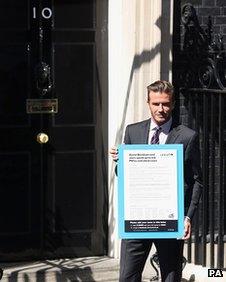David Beckham discusses global hunger plan with PM
- Published
David Beckham and David Cameron hope 'hunger summit' will draw attention to global malnutrition
David Beckham has met Prime Minister David Cameron to urge the UK to ensure child hunger remains a global priority.
The ex-England footballer and Unicef ambassador gave Mr Cameron a letter, calling on him to lead the way.
The UK is to host a "hunger summit" on the final day of the Olympics, hoping to use the global sporting event as a catalyst for progress on the issue.
The letter calls on the UK to "pick up the pace" when it takes over leadership of the G8 group of nations in 2013.
Mr Cameron said Britain had "a fantastic role to play".
The UK wants a fresh commitment to improve nutrition and help children in developing countries fulfil their potential to be one of the lasting legacies of the 2012 Games.
Some 170 million children in some of the world's poorest countries are affected by long-term hunger.
'Shared determination'

Mr Beckham says progress could be a lasting legacy of London 2012
During their meeting at Downing Street, Mr Beckham handed the prime minister a letter signed by 50 sports and film stars, urging him to "pick up the pace" on the issue and keep child hunger at the top of the global agenda.
No 10 said the two men had a "shared determination" to do as much as they could to focus the international community's attention and resources on the issue.
Mr Cameron wanted to use the opportunity of the Olympics to focus minds on the problem and the need to give millions of children a better start in life.
The lives of millions of children are blighted at an early age by malnutrition, a condition known as stunting which hinders their growth, physical abilities and capacity to learn. Those affected do not perform as well at school and go on to earn less.
Campaigners say intervening in the first 1,000 days from the start of pregnancy to treat and prevent vitamin deficiency can prevent permanent damage.
Next month's gathering will bring together world leaders, business figures, non-government organisations and development campaigners in an effort to generate renewed momentum and political will behind tackling malnutrition in Africa and other parties of the world.
No 10 said it would consider new ideas to help people and countries help themselves, through technological innovation and scientific advances, and through better transparency and accountability.
But Unicef says leaders must set an ambitious global target to reduce stunting, and businesses must make nutritious food more widely available to the most vulnerable.
- Published13 July 2012
- Published17 April 2012